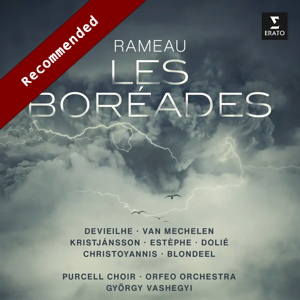
Jean-Philippe Rameau (1683-1764)
Les Boréades, tragédie-lyrique
Alphise, Sabine Devieilhe (soprano)
Abaris, Reinoud van Mechelen (tenor)
Calisis, Benedikt Krist Jánsson (tenor)
Borilée, Philipper Estèphe (baritone
Adamas, Apollo, Tassis Christoyannis (baritone)
Boree, Thomas Dolié (baritone)
Semire, Nymphe, L’Amour, Polymnie, Gwendoline Blondeel (soprano)
Purcell Choir, Orfeo Orchestra/György Vashegyi
rec. 2023, Béla Bartók National Concert Hall, Müpa Budapest, Hungary
French text and English translation included
Erato 2173237273 [2 CDs: 147]
I am not an expert on the French baroque, but I have always enjoyed what I have heard of Rameau. He writes attractive melodies, pungent harmonies and exciting rhythms. There is always something a bit unexpected about a work by Rameau. And he writes the most delightful dances. So when the opportunity came to review his legendary last opera, or tragédie lyrique as it is technically known, I jumped at it.
The work is legendary because its scheduled premiere in 1763 never took place, despite two dress rehearsals having been mounted. The reasons for this remain obscure, though intrigue, a fire and censorship have all been suggested. There was a single concert performance a few years later, after Rameau’s death. It then fell into oblivion, not being revived until 1964, when there was a broadcast performance. The first stage performance did not take place until 1975, under John Eliot Gardiner. There were then legal problems, possibly over copyright, which were not resolved until 2018. It has now been recorded several times. The present recording is one in a series undertaken on behalf ot the Société Jean-Philippe Rameau, which has already sponsored recordings of a number of the composer’s stage works. Great pains have been taken to secure authentic performance practice.
The story is one of those fanciful elaborations of Greek mythology which appealed to French aristocrats. It speaks well for them that this is the kind of thing they liked. Borée (Boreas) is the god of the North wind, who here has two sons, the princes Borilée and Calisis. Alphise, queen of Bactria, must choose between them. But she loves Abaris, whose origin is unknown. Abaris also loves her. Cupid gives her an enchanted arrow. The Boread princes force the issue. Alphise abdicates so as to be free to marry Abaris and gives him the arrow. The Boread princes persuade their father to send a thunderstorm and an earthquake, in the course of which he abducts Alphise. Abaris considers suicide but instead heads off to find Alphise. He immobilises the Boread princes with the enchanted arrow. Apollo then appears, reveals he is Abaris’s father, and so nothing stands in the way of Abaris marrying Alphise. There are also some interludes along the way.
This is a rather thin story. However, some of the ideas in the libretto would have been controversial at the time: the freedom to marry according to one’s choice, the contemplation of suicide, the possibility of someone of unknown birth rising to a high position. It is possible that the presence of these ideas led to the cancellation of the premiere. They seem uncontroversial now.
The presentation of this work is not dramatic in the way we have expected of operas from the time of Gluck onwards. There is, to me anyway, very little dramatic tension, even in the thunderstorm scenes of the third Act. This is because the work is made up of many very short pieces, with frequent interruptions of the main action by dances of various kinds. Having said that, the vocal numbers are all attractive, and the dances quite delightful. Despite being a tragédie lyrique, the work seems to me more of a divertissement, a piece of elegant and civilized entertainment which makes few demands on the listener.
I liked the singing here, particularly Sabine Devieilhe as Alphise and Reinoud van Mechelen as Abaris. But I actually enjoyed the dance numbers even more than the vocal ones, and here the palm must go to conductor György Vashegyi, who, I learn, is an old hand at Rameau, and his Orfeo orchestra, which has a higher proportion of wind to strings than you might expect. With excellent recording and an informative booklet containing the complete libretto in French and English, I find it hard to think it could be better done.
Stephen Barber
Buying this recording via a link below generates revenue for MWI, which helps the site remain free.



















